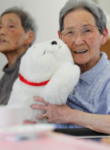#M4BW Japanese companies use technology to create value for an aging population
 Japan is concerned about how it will care for its elderly—especially those with dementia. The Japanese population is aging quicker than most of the world. Already, a quarter of the Japanese population is 65 or older (compared to just 15 percent of Americans). By 2025, Japan predicts a shortfall of almost 400,000 senior caregivers. Some companies are developing different intelligent agents to help fill the void.
Japan is concerned about how it will care for its elderly—especially those with dementia. The Japanese population is aging quicker than most of the world. Already, a quarter of the Japanese population is 65 or older (compared to just 15 percent of Americans). By 2025, Japan predicts a shortfall of almost 400,000 senior caregivers. Some companies are developing different intelligent agents to help fill the void.
Robots are particularly popular. Sony’s robotic pet dog Aibo, and SoftBank’s Paro, a robotic baby seal, have been shown to elicit emotional responses and yield benefits similar to live animal therapy (without all the owner responsibility). SoftBank Robotics’ humanoid companion “Pepper” recognizes faces and human emotions and asks and answers questions; seniors enjoy chatting with Pepper, which also monitors patients’ mental health for doctors and family members. Advances like these can provide health care at lower costs and make for better experiences for an aging world.
For some more background you can have your students read “Japan Lays Groundwork for Boom in Robot Carers,” The Guardian, February 5, 2018 and “Toyota, SoftBank Join Forces to Build Self-Driving Cars That Deliver Meals, Health Care,” Wall Street Journal, October 4, 2018 (subscription may be required).
This describes a demographic trend (part of context and the external market environment in Chapter 3). It might also tie into a discussion of market segmentation (Chapter 4) or product (Chapter 8).
